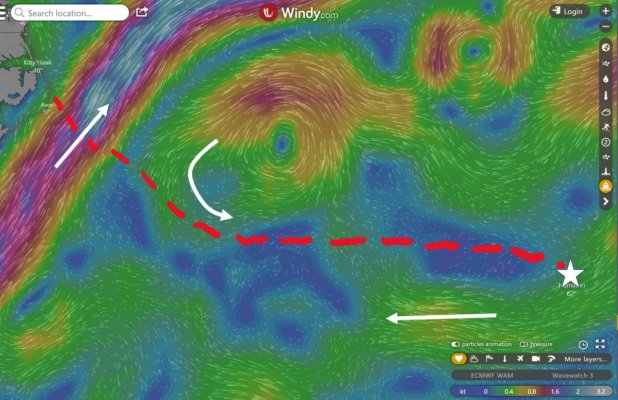Hi,
as one of so-called nay sayers, let me expand on a few points. As far as your experience goes, not such a big issue. You will have crew and can fill in your voids with experienced crew. My issue is the combination of that boat and the conditions you might run into.
Boats like Krogens and Nordhavns, purpose built for open ocean passages have a few critical design elements that I expect the GB 42 lacks. The K and the N have lower CG's (both carry about 10% of their GW in ballast), they have lower initial stability but higher ultimate stability. And they have significant reserve buoyancy. My Krogen has watertight bulkheads fore and aft, and the N's are similarly built.
So why might you care about all this, since you are going to choose a benign weather window in order to never test the roll limits of your ship?
That brings me back to weather. Yes, odds are you will have nice weather and calm seas, just as forecast. But anyone who has spent time in the North Atlantic has seen five day forecasts go wrong.
A couple of years ago we ran from Florida to Newport. When we left the forecast for day 4, off the Jersey coast, was for 15-20 knots out of the east. What we got was 25 knots out of the North. We chose not to bail out at Cape May, but had to put up with 6'-8' seas of short period on the nose for about eight hours. Uncomfortable in a Krogen, worse on a GB, but not life threatening.
Now lets transpose that same missed forecast to your trip coming back from Bermuda. You are day 3 or 4 and approaching the GS. There is a 6' swell from the south and a forecast for 20 knots out of the east. This would make for pretty sloppy conditions in the GS, but still survivable. Now lets interject the same missed forecast we had off NJ. 25 knots out of the North. The combination of the swell from the south, the 3 knot current and the wind driven wave will set up 10' standing waves in the stream. And now that CG and roll stability and reserve buoyancy that the GB does not have becomes life threatening. Maybe you can turn around, maybe you cant.
Although either a K or a N could handle these conditions, most never will see such. But we own boats like this because where we travel, stuff happens. Including missed forecasts. The longer we are out, and the further from land we get, the more uncertainty enters the risk equation. 600 miles out, in the North Atlantic, with the GS between you and the mainland, there is plenty of uncertainty. Its because of that uncertainty that we own boats that one might say are over designed for the conditions they normally sail in.
Yes the USCG saves lives at sea every day. And they dont stop to ask if you or your boat belongs out there. And every time any of us goes offshore we take a calculated risk. But responsible seamen do not include possible recovery by the USCG or another boat as part of our risk mitigation strategy. Mainly because it endangers their lives as well as ours.
There is lots you can do to make your GB better able to meet the challenge, but it will never be an offshore capable boat.



 We’ve subscribe to Chris Parker for our Bahama weather and have used him all through the Caribbean and imho he’s good. Is also know people that have used him for weather routing across the Atlantic. I think he’d be worth talking to.
We’ve subscribe to Chris Parker for our Bahama weather and have used him all through the Caribbean and imho he’s good. Is also know people that have used him for weather routing across the Atlantic. I think he’d be worth talking to.